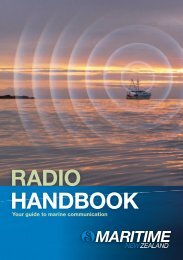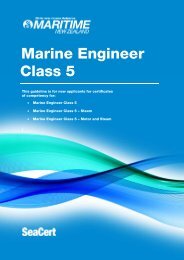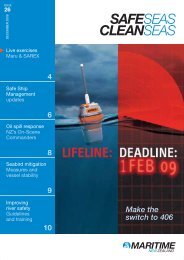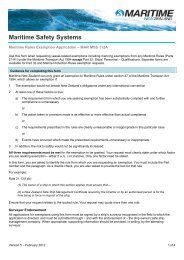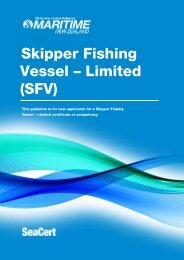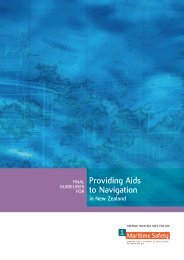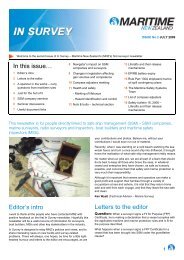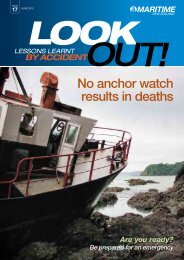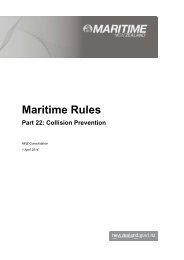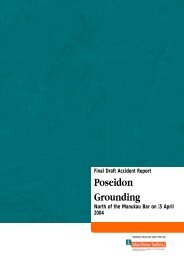New Zealand oil spill response strategy - Maritime New Zealand
New Zealand oil spill response strategy - Maritime New Zealand
New Zealand oil spill response strategy - Maritime New Zealand
You also want an ePaper? Increase the reach of your titles
YUMPU automatically turns print PDFs into web optimized ePapers that Google loves.
Appendix 6 – International Agreements<br />
Status<br />
In relation to marine <strong>oil</strong> pollution, the <strong>Maritime</strong> Transport Act covers prevention and control of <strong>oil</strong><br />
pollution, pollution from shipping casualties, civil liability for pollution damage, and compensation and<br />
funding. The <strong>Maritime</strong> Transport Act contains provisions that presently give effect to the following<br />
international conventions:<br />
• International Convention Relating to Intervention on the High Seas in Cases of Oil Pollution<br />
Casualties 1969 (Intervention);<br />
• The 1992 Protocol to the International Convention on Civil Liability for Oil Pollution Damage<br />
1969 (CLC);<br />
• Convention for the Protection of the Natural Resources and Environment of the South Pacific<br />
Region and related protocols (South Pacific Regional Environment Programme - SPREP 1986);<br />
• International Convention on Prevention of Pollution from Ships 1973 and its 1978 Protocol<br />
(MARPOL);<br />
• The 1992 Protocol to the International Convention on Establishment of an International Fund for<br />
Compensation for Oil Pollution Damage 1971 (Fund)<br />
• International Convention on Oil Spill Preparedness, Response and Co-operation 1990 (OPRC<br />
90).<br />
Other International Arrangements<br />
Reciprocal arrangements are in place with governments of other nations, for access to equipment and<br />
personnel in the event of a major <strong>oil</strong> <strong>spill</strong>.<br />
<strong>Maritime</strong> <strong>New</strong> <strong>Zealand</strong> has a memorandum of understanding for mutual assistance with the Australian<br />
<strong>Maritime</strong> Safety Authority. Through this, <strong>Maritime</strong> NZ gains access to the equipment, personnel and<br />
expertise of both government and private sector (<strong>oil</strong> industry) <strong>response</strong> capability throughout Australia.<br />
There are also obligations to nations or regions with administrative ties to <strong>New</strong> <strong>Zealand</strong>, including<br />
Tokelau and Niue, and an arrangement is currently being negotiated with government agencies in <strong>New</strong><br />
Caledonia.<br />
Antarctica<br />
<strong>New</strong> <strong>Zealand</strong> is party to the Environmental Protocol to the Antarctic Treaty, which sets out the nation’s<br />
obligations for <strong>oil</strong> <strong>spill</strong> contingency planning in section 12 and establishes levels of liability in the<br />
recently adopted Liability Annex. The Protocol has been enacted in <strong>New</strong> <strong>Zealand</strong> law by means of the<br />
Antarctica (Environmental Protection) Act 1994, which allows for the Governor-General to extend<br />
provisions of the <strong>Maritime</strong> Transport Act into the Antarctic region under section 54.<br />
Generally, the nation’s Antarctic responsibilities are administered by both the Ministry of Foreign Affairs<br />
and Trade and Antarctica <strong>New</strong> <strong>Zealand</strong>. <strong>Maritime</strong> <strong>New</strong> <strong>Zealand</strong> has been and will continue to be active<br />
in assisting Antarctica <strong>New</strong> <strong>Zealand</strong> with appropriate technical advice in developing a regional<br />
contingency plan.<br />
Voluntary Industry Agreements<br />
• Equipment arrangements with the Australian Marine Oil Spill Centre (AMOSC) and East Asia<br />
Response Ltd (EARL);<br />
• Equipment arrangements with Oil Spill Response Ltd (OSRL) in the United Kingdom.<br />
32





